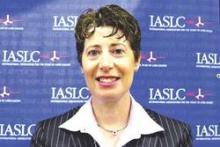DENVER – Genomic testing in young patients with lung cancer is critical, as the majority have adenocarcinomas harboring driver alterations that can be targeted with drugs available today, suggested a trio of cohort studies presented at a conference sponsored by the International Association for the Study of Lung Cancer.
More than three-fourths of patients aged 40 years or younger with adenocarcinoma were found to have driver alterations in genes such as those for epidermal growth factor receptor (EGFR), anaplastic lymphoma kinase (ALK), and ROS proto-oncogene 1 (ROS1), investigators reported in a session and related press conference.
“Lung cancer under 40 is a group of patients who are enriched for actionable mutations,” commented invited discussant Dr. Benjamin Levy, assistant professor of medicine, Mount Sinai School of Medicine; medical director of the thoracic oncology program for the Mount Sinai Health System; and associate director of the cancer clinical trials office at Mount Sinai Hospital – all in New York. “I think that if there was ever a clinical circumstance in which next-generation sequencing should be performed routinely outside a clinical trial, it’s for these patients under 40.”
Of note, in two of the three studies, the majority of patients had some history of smoking, “suggesting that this lung cancer in patients under 40 is not necessarily a nonsmoking disease,” he said. “It’s wonderful to have great drugs for those patients who do develop lung cancer, but instituting preventive measures for tobacco control and education does wonders.”
New study design expands enrollment options
In the first study, a team led by Dr. Barbara J. Gitlitz, associate professor of clinical medicine at the University of Southern California in Los Angeles, analyzed data from the Genomics of Young Lung Cancer Study, the first to prospectively assess clinical characteristics and genomic alterations of this population.
The study is open to patients younger than 40 years at diagnosis. All are tested for alterations of EGFR, BRAF, HER2, KRAS, ALK, ROS1, and RET, and those negative for alterations in these genes have additional testing.
“One interesting point of our study is that people can enter either through coming to a [brick and mortar] site that has IRB approval or through a website (https://www.openmednet.org/site/alcmi-goyl) where people can remotely consent anywhere in the world and participate in our clinical trial,” Dr. Gitlitz noted.
In fact, of the 68 patients enrolled in the first year, 44% did so through the website, including some from as far away as Australia, Norway, and Turkey. The patients ranged in age from 16 to 39 years at diagnosis (median, 35 years), and 52% were female. They tended to be never-smokers, Dr. Gitlitz reported.
Fifty of the patients had stage IV adenocarcinoma at diagnosis. In this group, 76% were found to have known actionable driver alterations – most commonly in ALK (44%), EGFR (26%), or ROS1 (6%). The prevalence was higher among women than men (95% vs 74%), “so there might be a different genomic spectrum of females to males,” she said.
Another 14% had other driver mutations identified, most of which also were targetable. Of note, this group included a young man found to have a previously unknown EGFR kinase domain duplication who had a response to afatinib (Cancer Discov. 2015 Aug. 18. doi: 10.1158/2159-8290.CD-15-0654). “So a new, actionable EGFR mutation has been discovered through looking at young-emergent lung cancer,” noted Dr. Gitlitz.
“We hypothesized that this cohort may be a special population enriched for driver mutations, but we have far exceeded our statistical expectations, with the majority having an actionable mutation for which they are on targeted therapy, greater than 76%,” she said. “A website allowing for virtual consenting so that patients can participate remotely and use social networking to share trial information is a novel, feasible way to conduct research across continents.”
“We will continue accrual for at least another year, and my plea at this international congress is that we would very much love more international participation,” she concluded. “Ultimately, we plan a follow-up study, Epidemiology of Young Lung Cancer, to build upon our unique web-based, patient-engaged trial design.”
Dr. Levy, the discussant, commented, “This study should be lauded … for taking the additional steps to look at both somatic and germline mutations via whole-exome next-generation sequencing, and also pushing the envelope for those who have no matching mutation in evaluating relevant alterations via next-generation sequencing and cell-free DNA.”
He also commended the novel web-based recruitment and consenting design, saying, “We have to put this in the context that only 5% of all lung cancer patients go on clinical trials. Anything we can do that’s novel or outside the box, as done here, is a welcome change.”


